Unordered Sets As explained in this chapter a set is a colle
(Unordered Sets) As explained in this chapter, a set is a collection of distinct elements of the same type. Design the class unorderedSetType, derived from the class unorderedArrayListType, to manipulate sets. Note that you need to redefine only the functions insertAt, insertEnd, and replaceAt. If the item to be inserted is already in the list, the functions insertAt and insertEnd output an appropriate message. Similarly, if the item to be replaced is already in the list, the function replaceAt outputs an appropriate message.Include the set operations of union and intersection in your class. Also write a program to test your class. (C++)
#ifndef UNORDEREDARRAYLISTTYPE_H
#define UNORDEREDARRAYLISTTYPE_H
#include \"arrayListType.h\"
class unorderedArrayListType : public arrayListType {
public:
void insertAt(int location, int insertItem);
// Function to insert an item at a particular location
// Postcondition: The item has been added to the list and the length has
// been increased by 1.
void insertEnd(int insertItem);
// Function to insert an item at the end of the list
// Postcondition: The item has been added at the end of the list and the
// length has been increased by 1.
void replaceAt(int location, int repItem);
// Function to replace an item in the list.
// Postcondition: repItem overrwrites the item at the specified location
// in the list. The length of the list is unchanged.
int seqSearch(int searchItem) const;
// Function to search the list for searchItem. Note that this is an
// abstract function.
//Postcondition: If the item is found, returns the location in the array
// where the item is found; otherwise, returns -1.
void remove(int removeItem);
// Function to remove an item from the list
// Postcondition: If the item is found in the list, it is removed and the
// length of the list is decreased by 1; if the item is not in the list
// an appropriate message is displayed.
void removeAll(int removeItem);
// Function to remove all occurrences of an item from the list
// Postcondition: If the item is found in the the list, all occurrences are
// removed and the length of the list is decreased accordingly. If the
// item is not in the list an appropriate message is displayed.
unorderedArrayListType(int size = 100);
//Constructor.
};
#endif // UNORDEREDARRAYLISTTYPE_H
#include \"UnorderedArrayListType.h\"
#include <iostream>
using namespace std;
void unorderedArrayListType::insertAt(int location,
int insertItem) {
if (location < 0 || location >= maxSize)
cout<<\"The position of the item to be inserted is out of range.\"<<endl;
else if (length >= maxSize) //list is full
cout << \"Cannot insert in a full list\" << endl;
else {
for (int i = length; i > location; i--)
list[i] = list[i - 1]; //move the elements down
list[location] = insertItem; //insert the item at the specified position
length++; //increment the length
}
} //end insertAt
void unorderedArrayListType::insertEnd(int insertItem) {
if (length >= maxSize) //the list is full
cout << \"Cannot insert in a full list.\" << endl;
else {
list[length] = insertItem; //insert the item at the end
length++; //increment the length
}
} //end insertEnd
int unorderedArrayListType::seqSearch(int searchItem) const {
int loc;
bool found = false;
loc = 0;
while (loc < length && !found)
if (list[loc] == searchItem)
found = true;
else
loc++;
if (found) return loc;
else
return -1;
} //end seqSearch
void unorderedArrayListType::remove(int removeItem) {
int loc;
if (length == 0)
cout << \"Cannot delete from an empty list.\" << endl;
else {
loc = seqSearch(removeItem);
if (loc != -1)
removeAt(loc);
else
cout << \"The item to be deleted is not in the list.\" << endl;
}
} //end remove
void unorderedArrayListType::removeAll(int removeItem) {int loc;
if (length == 0)
cout << \"Cannot delete from an empty list.\" << endl;
else{
// Find and remove the first occurrence of removeItem (if there is one)
loc = seqSearch(removeItem);
if (loc != -1)
removeAt(loc);
else
cout << \"The item to be deleted is not in the list.\" << endl;
}
// Set up a loop to find other occurrences and delete them as well
while (loc != -1)
{
loc = seqSearch(removeItem);
if (loc != -1)removeAt(loc);
}
}
void unorderedArrayListType::replaceAt(int location, int repItem) {
if (location < 0 || location >= length)
cout << \"The location of the item to be replaced is out of range.\" << endl;
else
list[location] = repItem;
} //end replaceAt
unorderedArrayListType::unorderedArrayListType(int size)
: arrayListType(size) {
} //end constructor
#ifndef ARRAYLISTTYPE_H
#define ARRAYLISTTYPE_H
class arrayListType {
public:
bool isEmpty() const;
//Function to determine whether the list is empty
//Postcondition: Returns true if the list is empty;
//otherwise, returns false.
bool isFull() const;
//Function to determine whether the list is full
//Postcondition: Returns true if the list is full;
//otherwise, returns false.
int listSize() const;
//Function to determine the number of elements in
//the list.
//Postcondition: Returns the value of length.
int maxListSize() const;
//Function to determine the maximum size of the list
//Postcondition: Returns the value of maxSize.
void print() const;
//Function to output the elements of the list
//Postcondition: Elements of the list are output on the
//standard output device.
bool isItemAtEqual(int location, int item) const;
//Function to determine whether item is the same as
//the item in the list at the position specified
//by location.
//Postcondition: Returns true if the list[location]
//is the same as item; otherwise,
//returns false.
//If location is out of range, an
//appropriate message is displayed.
virtual void insertAt(int location, int insertItem) = 0;
//Function to insert insertItem in the list at the
//position specified by location.
//Note that this is an abstract function.
//Postcondition: Starting at location, the elements of
//the list are shifted down,
//list[location] = insertItem; length++;
//If the list is full or location is out o
//range, an appropriate message is displayed.
virtual void insertEnd(int insertItem) = 0;
//Function to insert insertItem at the end of
//the list. Note that this is an abstract function.
//Postcondition: list[length] = insertItem; and length++;
//If the list is full, an appropriate
//message is displayed.
void removeAt(int location);
//Function to remove the item from the list at the
//position specified by location
//Postcondition: The list element at list[location] is
//removed and length is decremented by 1.
//If location is out of range, an
//appropriate message is displayed.
void retrieveAt(int location, int& retItem) const;
//Function to retrieve the element from the list at the
//position specified by location
//Postcondition: retItem = list[location]
//If location is out of range, an
//appropriate message is displayed.
virtual void replaceAt(int location, int repItem) = 0;
//Function to replace repItem the element in the list
//at the position specified by location.
//Note that this is an abstract function.
//Postcondition: list[location] = repItem
//If location is out of range, an
//appropriate message is displayed.
void clearList();
//Function to remove all the elements from the list
//After this operation, the size of the list is zero.
//Postcondition: length = 0;
virtual int seqSearch(int searchItem) const = 0;
//Function to search the list for searchItem.
//Note that this is an abstract function.
//Postcondition: If the item is found, returns the
//location in the array where the item is
//found; otherwise, returns -1.
virtual void remove(int removeItem) = 0;
//Function to remove removeItem from the list.
//Note that this is an abstract function.
//Postcondition: If removeItem is found in the list,
//it is removed from the list and length
//is decremented by one.
virtual void removeAll(int removeItem) = 0;
//Function to remove all instances of removeItem from the list.
//Note that this is an abstract function.
//Postcondition: If there are any instances of removeItem in the list,
//they are all removed and the length of the list is decremented
//accordingly
arrayListType(int size = 100);
//Constructor
//Creates an array of the size specified by the
//parameter size. The default array size is 100.
//Postcondition: The list points to the array, length = 0,
//and maxSize = size;
arrayListType(const arrayListType& otherList);
//Copy constructor
virtual ~arrayListType();
//Destructor
//Deallocate the memory occupied by the array.
protected:
int *list; //array to hold the list elements
int length; //variable to store the length of the list
int maxSize; //variable to store the maximum
//size of the list
};
#endif /* ARRAYLISTTYPE_H */
#include <iostream>
#include \"arrayListType.h\"
using namespace std;
bool arrayListType::isEmpty() const {
return (length == 0);
} //end isEmpty
bool arrayListType::isFull() const {
return (length == maxSize);
} //end isFull
int arrayListType::listSize() const {
return length;
} //end listSize
int arrayListType::maxListSize() const {
return maxSize;
} //end maxListSize
void arrayListType::print() const {
for (int i = 0; i < length; i++)
cout<<list[i]<<\" \";
cout << endl;
} //end print
bool arrayListType::isItemAtEqual(int location, int item) const {
if (location < 0 || location >= length) {
cout<<\"The location of the item to be removed is out of range.\"<<endl;
return false;
} else
return (list[location] == item);
} //end isItemAtEqual
void arrayListType::removeAt(int location) {
if (location < 0 || location >= length)
cout<<\"The location of the item to be removed is out of range.\"<<endl;
else {
for (int i = location; i < length - 1; i++)
list[i] = list[i + 1];
length--;
}
} //end removeAt
void arrayListType::retrieveAt(int location, int& retItem) const {
if (location < 0 || location >= length)
cout << \"The location of the item to be retrieved is out of range\" << endl;
else
retItem = list[location];
} //end retrieveAt
void arrayListType::clearList() {
length = 0;
} //end clearList
arrayListType::arrayListType(int size) {
if (size <= 0) {
cout << \"The array size must be positive. Creating an array of the size 100.\" << endl;
maxSize = 100;
} else
maxSize = size;
length = 0;
list = new int[maxSize];
} //end constructor
arrayListType::~arrayListType() {
delete [] list;
} //end destructor
arrayListType::arrayListType(const arrayListType& otherList) {
maxSize = otherList.maxSize;
length = otherList.length;
list = new int[maxSize]; //create the array
for (int j = 0; j < length; j++) //copy otherList
list[j] = otherList.list[j];
}//end copy constructor
Solution
main.cpp
#include <iostream>
#include \"unorderedSetType.h\"
#include \"unorderedArrayListType.h\"
#include \"arrayListType.h\"
using namespace std;
int main()
{
unorderedSetType intList(25);
unorderedSetType intList2(25);
unorderedSetType testUnion(50);
unorderedSetType testIntersection(25);
int number, repItem, searchItem;
cout << \"Enter 8 integers: \";
for (int count = 0; count < 8; count++)
{
cin >> number;
intList.insertEnd(number);
}
number = 0;
cout << \"Enter 8 integers (2nd set): \";
for (int count = 0; count < 8; count++)
{
cin >> number;
intList2.insertEnd(number);
}
cout << endl;
cout << \"intList: \";
intList.print();
cout << endl;
cout << \"intList2: \";
intList2.print();
cout << endl;
cout << \"Attempting to run a union function on lists 1 and 2...\" << endl;
testUnion.setUnion(intList, intList2);
cout << \"Third list (union): \";
testUnion.print();
cout << endl;
cout << \"Attempting to run an intersection function on lists 1 and 2...\" << endl;
testIntersection.getIntersection(intList, intList2);
cout << \"Fourth list (intersection): \";
testIntersection.print();
cout << endl;
cout << \"Choose a number to be replaced (list 1): \";
intList.print();
cout << endl;
cin >> searchItem;
cout << endl << \"Enter the number you would like to replace \'\" << searchItem << \"\' with in list 1: \";
cin >> repItem;
cout << endl;
intList.replaceAt(searchItem, repItem);
cout << \"List 1, following replacement function: \";
intList.print();
cout << endl;
return 0;
}
arrayListType.h
#ifndef H_arrayListType
#define H_arrayListType
class arrayListType
{
public:
bool isEmpty() const;
//Function to determine whether the list is empty
//Postcondition: Returns true if the list is empty;
// otherwise, returns false.
bool isFull() const;
//Function to determine whether the list is full
//Postcondition: Returns true if the list is full;
// otherwise, returns false.
int listSize() const;
//Function to determine the number of elements in
//the list.
//Postcondition: Returns the value of length.
int maxListSize() const;
//Function to determine the maximum size of the list
//Postcondition: Returns the value of maxSize.
void print() const;
//Function to output the elements of the list
//Postcondition: Elements of the list are output on the
// standard output device.
bool isItemAtEqual(int location, int item) const;
//Function to determine whether item is the same as
//the item in the list at the position specified
//by location.
//Postcondition: Returns true if list[location]
// is the same as item; otherwise,
// returns false.
// If location is out of range, an
// appropriate message is displayed.
virtual void insertAt(int location, int insertItem) = 0;
//Function to insert insertItem in the list at the
//position specified by location.
//Note that this is an abstract function.
//Postcondition: Starting at location, the elements of
// the list are shifted down,
// list[location] = insertItem; length++;
// If the list is full or location is out of
// range, an appropriate message is displayed.
virtual void insertEnd(int insertItem) = 0;
//Function to insert insertItem an item at the end of
//the list. Note that this is an abstract function.
//Postcondition: list[length] = insertItem; and length++;
// If the list is full, an appropriate
// message is displayed.
void removeAt(int location);
//Function to remove the item from the list at the
//position specified by location
//Postcondition: The list element at list[location] is
// removed and length is decremented by 1.
// If location is out of range, an
// appropriate message is displayed.
void retrieveAt(int location, int& retItem) const;
//Function to retrieve the element from the list at the
//position specified by location
//Postcondition: retItem = list[location]
// If location is out of range, an
// appropriate message is displayed.
virtual void replaceAt(int location, int repItem) = 0;
//Function to replace the elements in the list
//at the position specified by location.
//Note that this is an abstract function.
//Postcondition: list[location] = repItem
// If location is out of range, an
// appropriate message is displayed.
void clearList();
//Function to remove all the elements from the list
//After this operation, the size of the list is zero.
//Postcondition: length = 0;
virtual int seqSearch(int searchItem) const = 0;
//Function to search the list for searchItem.
//Note that this is an abstract function.
//Postcondition: If the item is found, returns the
// location in the array where the item is
// found; otherwise, returns -1.
virtual void remove(int removeItem) = 0;
//Function to remove removeItem from the list.
//Note that this is an abstract function.
//Postcondition: If removeItem is found in the list,
// it is removed from the list and length
// is decremented by one.
arrayListType(int size = 100);
//Constructor
//Creates an array of the size specified by the
//parameter size. The default array size is 100.
//Postcondition: The list points to the array, length = 0,
// and maxSize = size;
arrayListType (const arrayListType& otherList);
//Copy constructor
virtual ~arrayListType();
//Destructor
//Deallocate the memory occupied by the array.
protected:
int *list; //array to hold the list elements
int length; //variable to store the length of the list
int maxSize; //variable to store the maximum
//size of the list
};
#endif
arrayListTypeImp.cpp
#ifndef H_arrayListType
#define H_arrayListType
class arrayListType
{
public:
bool isEmpty() const;
//Function to determine whether the list is empty
//Postcondition: Returns true if the list is empty;
// otherwise, returns false.
bool isFull() const;
//Function to determine whether the list is full
//Postcondition: Returns true if the list is full;
// otherwise, returns false.
int listSize() const;
//Function to determine the number of elements in
//the list.
//Postcondition: Returns the value of length.
int maxListSize() const;
//Function to determine the maximum size of the list
//Postcondition: Returns the value of maxSize.
void print() const;
//Function to output the elements of the list
//Postcondition: Elements of the list are output on the
// standard output device.
bool isItemAtEqual(int location, int item) const;
//Function to determine whether item is the same as
//the item in the list at the position specified
//by location.
//Postcondition: Returns true if list[location]
// is the same as item; otherwise,
// returns false.
// If location is out of range, an
// appropriate message is displayed.
virtual void insertAt(int location, int insertItem) = 0;
//Function to insert insertItem in the list at the
//position specified by location.
//Note that this is an abstract function.
//Postcondition: Starting at location, the elements of
// the list are shifted down,
// list[location] = insertItem; length++;
// If the list is full or location is out of
// range, an appropriate message is displayed.
virtual void insertEnd(int insertItem) = 0;
//Function to insert insertItem an item at the end of
//the list. Note that this is an abstract function.
//Postcondition: list[length] = insertItem; and length++;
// If the list is full, an appropriate
// message is displayed.
void removeAt(int location);
//Function to remove the item from the list at the
//position specified by location
//Postcondition: The list element at list[location] is
// removed and length is decremented by 1.
// If location is out of range, an
// appropriate message is displayed.
void retrieveAt(int location, int& retItem) const;
//Function to retrieve the element from the list at the
//position specified by location
//Postcondition: retItem = list[location]
// If location is out of range, an
// appropriate message is displayed.
virtual void replaceAt(int location, int repItem) = 0;
//Function to replace the elements in the list
//at the position specified by location.
//Note that this is an abstract function.
//Postcondition: list[location] = repItem
// If location is out of range, an
// appropriate message is displayed.
void clearList();
//Function to remove all the elements from the list
//After this operation, the size of the list is zero.
//Postcondition: length = 0;
virtual int seqSearch(int searchItem) const = 0;
//Function to search the list for searchItem.
//Note that this is an abstract function.
//Postcondition: If the item is found, returns the
// location in the array where the item is
// found; otherwise, returns -1.
virtual void remove(int removeItem) = 0;
//Function to remove removeItem from the list.
//Note that this is an abstract function.
//Postcondition: If removeItem is found in the list,
// it is removed from the list and length
// is decremented by one.
arrayListType(int size = 100);
//Constructor
//Creates an array of the size specified by the
//parameter size. The default array size is 100.
//Postcondition: The list points to the array, length = 0,
// and maxSize = size;
arrayListType (const arrayListType& otherList);
//Copy constructor
virtual ~arrayListType();
//Destructor
//Deallocate the memory occupied by the array.
protected:
int *list; //array to hold the list elements
int length; //variable to store the length of the list
int maxSize; //variable to store the maximum
//size of the list
};
#endif
unorderedArrayListType.h
#ifndef H_unorderedArrayListType
#define H_unorderedArrayListType
#include \"arrayListType.h\"
class unorderedArrayListType: public arrayListType
{
public:
void insertAt(int location, int insertItem);
void insertEnd(int insertItem);
void replaceAt(int, int);
int seqSearch(int searchItem) const;
void remove(int removeItem);
unorderedArrayListType(int size = 100);
//Constructor
};
#endif
unorderedArrayListTypeImp.cpp
#include <iostream>
#include \"unorderedArrayListType.h\"
using namespace std;
void unorderedArrayListType::insertAt(int location,
int insertItem)
{
if (location < 0 || location >= maxSize)
cout << \"The position of the item to be inserted \"
<< \"is out of range.\" << endl;
else if (length >= maxSize) //list is full
cout << \"Cannot insert in a full list\" << endl;
else
{
for (int i = length; i > location; i--)
list[i] = list[i - 1]; //move the elements down
list[location] = insertItem; //insert the item at
//the specified position
length++; //increment the length
}
} //end insertAt
void unorderedArrayListType::insertEnd(int insertItem)
{
if (length >= maxSize) //the list is full
cout << \"Cannot insert in a full list.\" << endl;
else
{
list[length] = insertItem; //insert the item at the end
length++; //increment the length
}
} //end insertEnd
int unorderedArrayListType::seqSearch(int searchItem) const
{
int loc;
bool found = false;
loc = 0;
while (loc < length && !found)
if (list[loc] == searchItem)
found = true;
else
loc++;
if (found)
return loc;
else
return -1;
} //end seqSearch
void unorderedArrayListType::remove(int removeItem)
{
int loc;
if (length == 0)
cout << \"Cannot delete from an empty list.\" << endl;
else
{
loc = seqSearch(removeItem);
if (loc != -1)
removeAt(loc);
else
cout << \"The item to be deleted is not in the list.\"
<< endl;
}
} //end remove
void unorderedArrayListType::replaceAt(int location, int repItem)
{
if (location < 0 || location >= length)
cout << \"The location of the item to be \"
<< \"replaced is out of range.\" << endl;
else
list[location] = repItem;
} //end replaceAt
unorderedArrayListType::unorderedArrayListType(int size)
: arrayListType(size)
{
} //end constructor
unorderedSetType.h
#ifndef UNORDEREDSETTYPE_H_INCLUDED
#define UNORDEREDSETTYPE_H_INCLUDED
#include \"unorderedArrayListType.h\"
using namespace std;
class unorderedSetType: public unorderedArrayListType
{
public:
void insertAt(int location, int insertItem);
void insertEnd(int insertItem);
// Function used to insert items into the end of an array.
// Postcondition: User input number is added to the end of the active list.
// If number is already in the array, error is printed and request is ignored.
void replaceAt(int searchItem, int repItem);
// Function used to replace a specific item in an array.
// Postcondition: User chosen list number is replaced with user chosen integer.
// If number is already in the array, error is printed and request is ignored.
void setUnion(unorderedSetType intList, unorderedSetType intList2);
// Function used to merge two arrays.
// Postcondition: Specified union array contains a union of two arrays, excluding duplicates
// Uses the insertEnd function, which prevents duplicates from existing
//
void getIntersection(unorderedSetType intList, unorderedSetType intList2);
// Function used to find the intersection of two arrays.
// Postcondition: Specified intersection array contains non-duplicate values of items contained
// in both arrays.
// Uses the insertEnd function, which prevents duplicates from existing
unorderedSetType(int size = 100);
};
#endif // UNORDEREDSETTYPE_H_INCLUDED
unorderedSetTypeImp.cpp
#include <iostream>
#include \"unorderedSetType.h\"
using namespace std;
void unorderedSetType::insertAt(int location, int insertItem)
{
insertEnd(insertItem);
}
void unorderedSetType::insertEnd(int insertItem)
{
int searchItem = insertItem;
int loc;
loc = unorderedArrayListType::seqSearch(searchItem);
if (length >= maxSize) //the list is full
{
cout << \"Cannot insert in a full list.\" << endl;
}
else if(loc >= 0)
{
cout << list[loc] << \" is already in list. Ignoring request.\" << endl << endl;
}
else
{
list[length] = insertItem; //insert the item at the end
length++; //increment the length
}
}
void unorderedSetType::replaceAt(int searchItem, int repItem)
{
int loc;
loc = unorderedArrayListType::seqSearch(searchItem);
if (loc < 0 || loc >= length)
{
cout << \"The location of the item to be replaced is out of range.\" << endl;
}
else if(unorderedArrayListType::seqSearch(repItem) >= 0)
{
cout << list[unorderedArrayListType::seqSearch(repItem)] << \" is already in list. Ignoring request.\" << endl << endl;
}
else
{
list[loc] = repItem;
}
}
void unorderedSetType::setUnion(unorderedSetType intList, unorderedSetType intList2)
{
unorderedSetType testUnion;
int look;
for (int i = 0; i < 8; i++)
{
look = intList.list[i];
testUnion.insertEnd(look);
look = intList2.list[i];
testUnion.insertEnd(look);
}
}
void unorderedSetType::getIntersection(unorderedSetType intList, unorderedSetType intList2)
{
unorderedSetType testIntersection;
int look;
for (int i = 0; i < 8; i++)
{
look = intList.list[i];
if(intList2.seqSearch(look) >= 0)
{
testIntersection.insertEnd(look);
}
}
}
unorderedSetType::unorderedSetType(int size)
{
} //end constructor
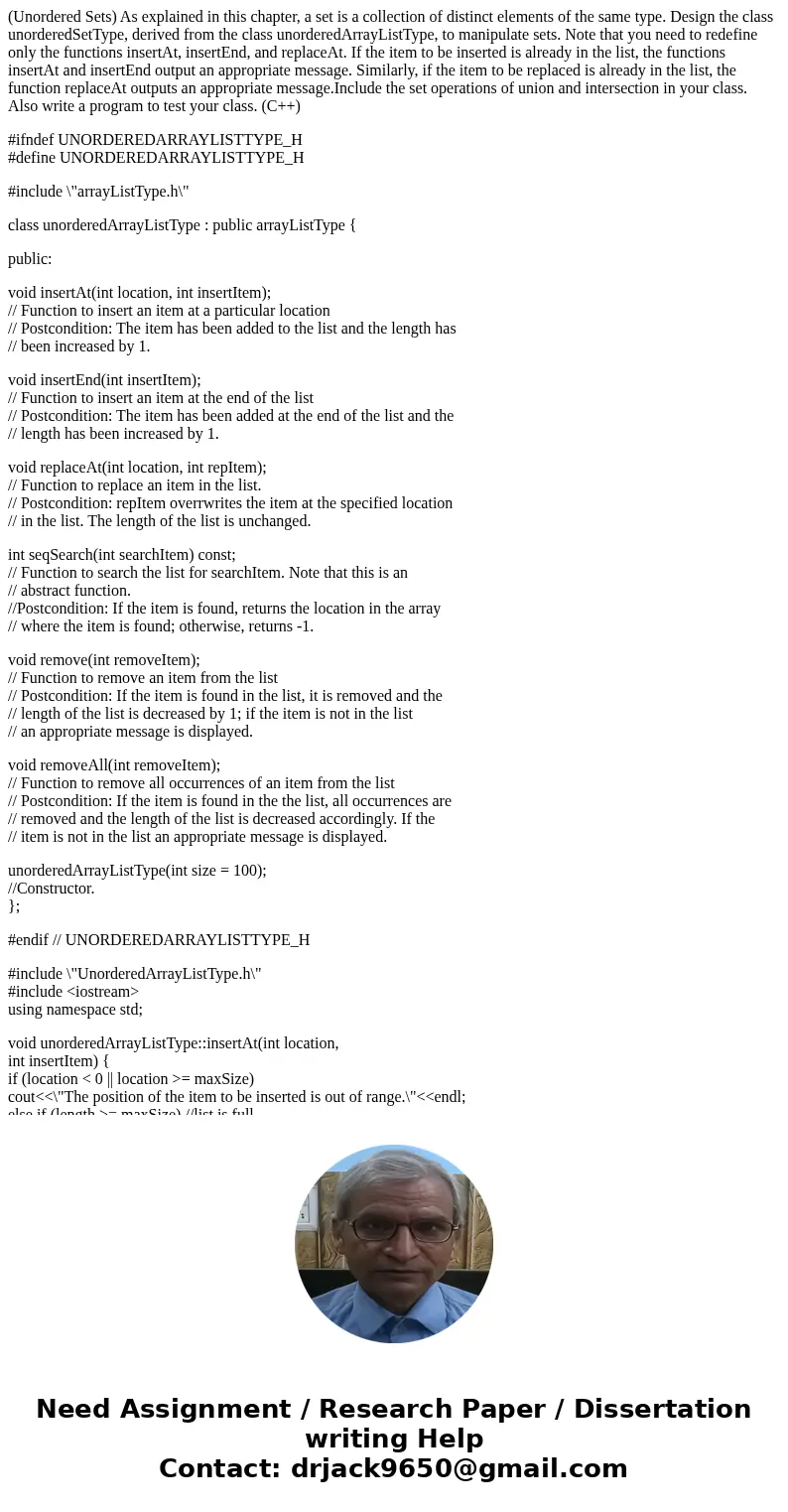
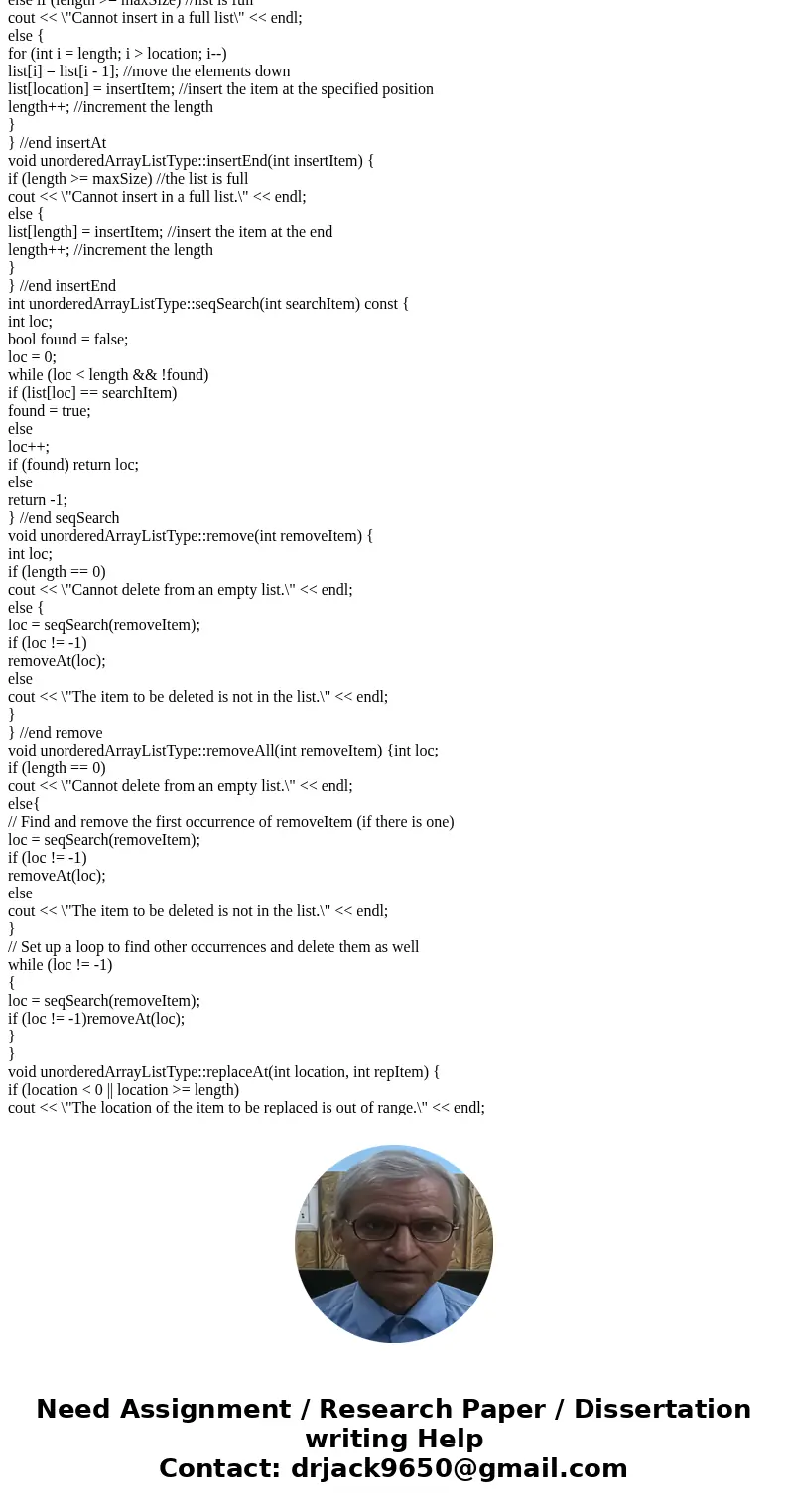
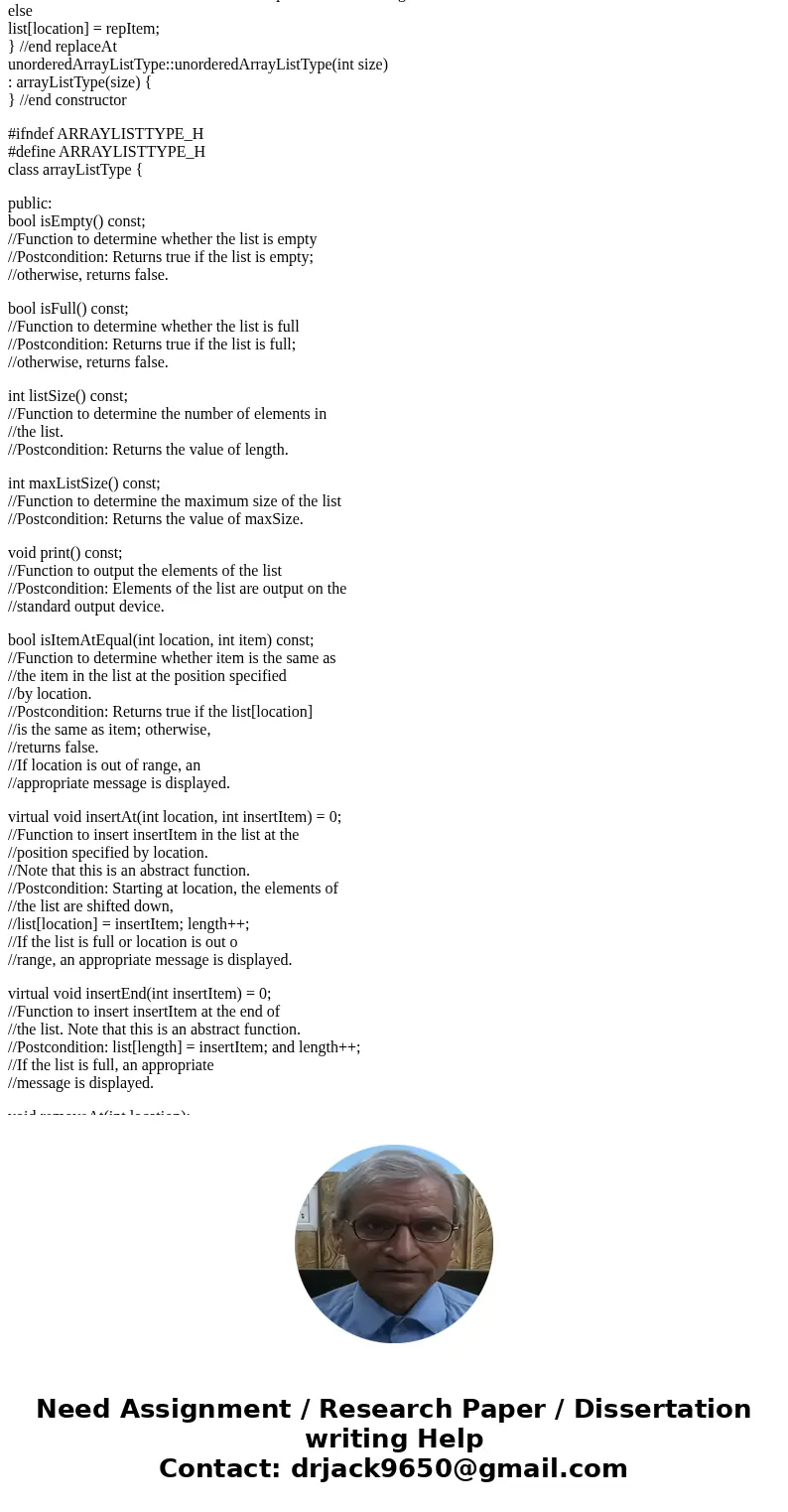
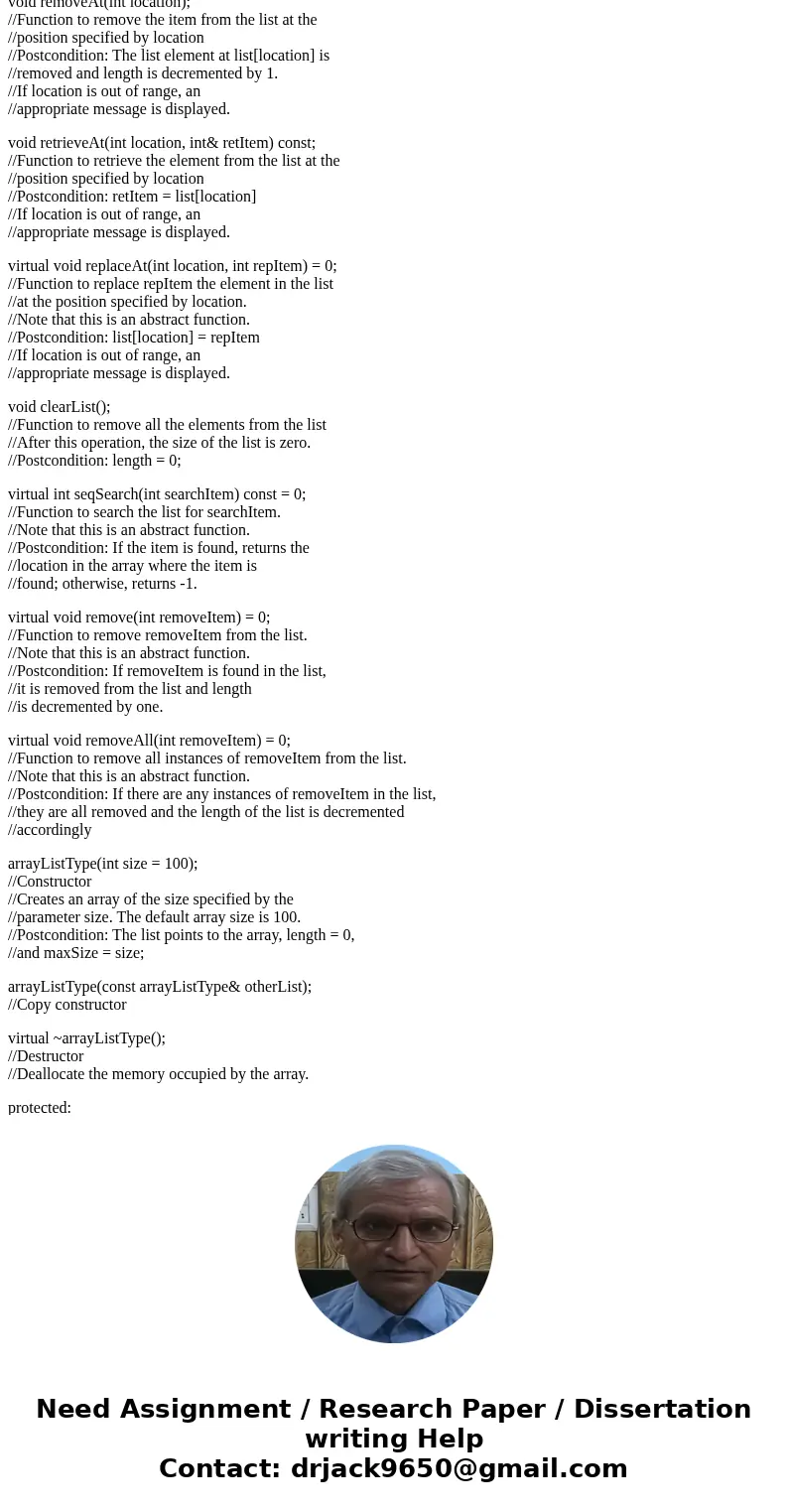
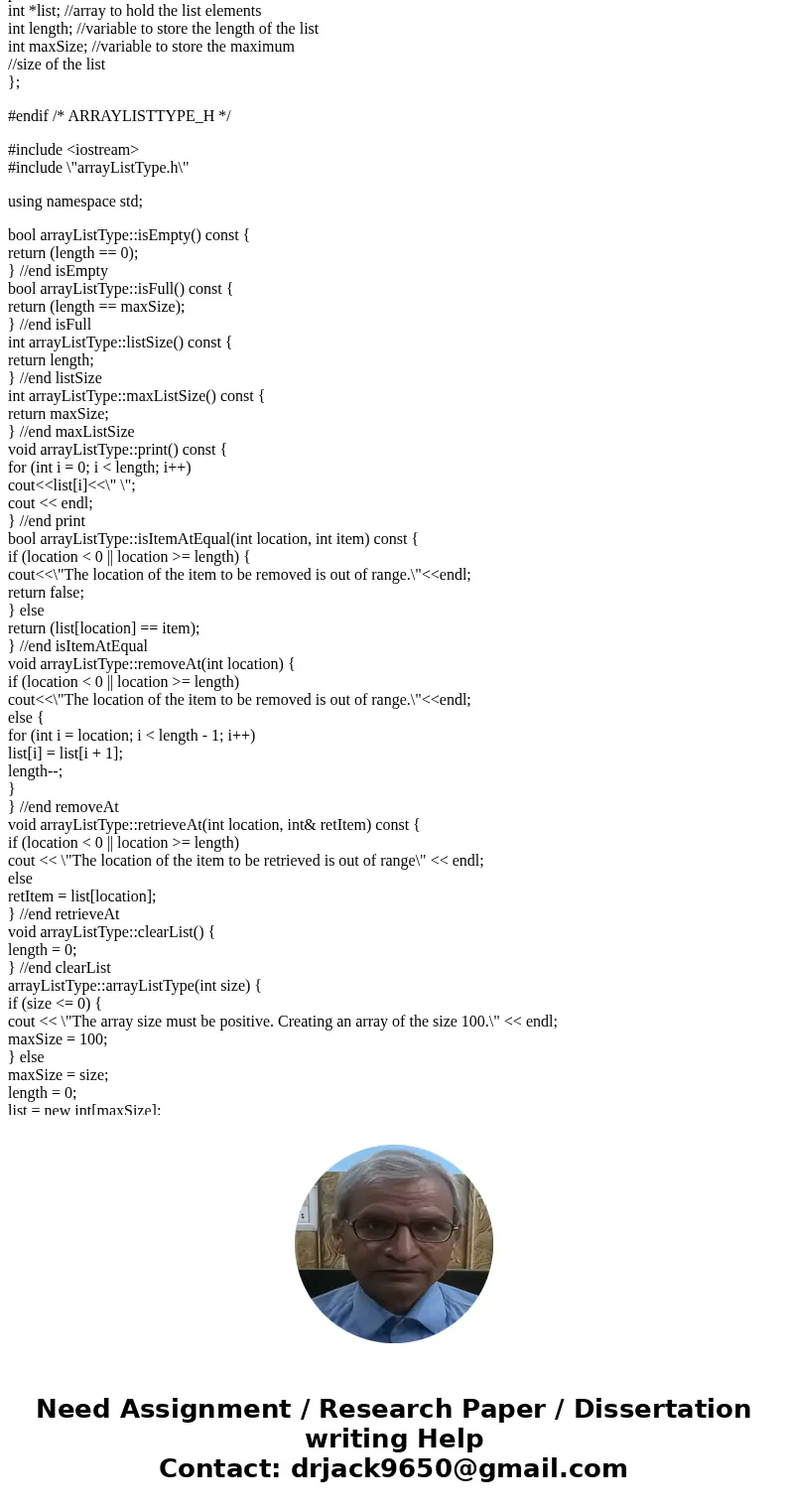
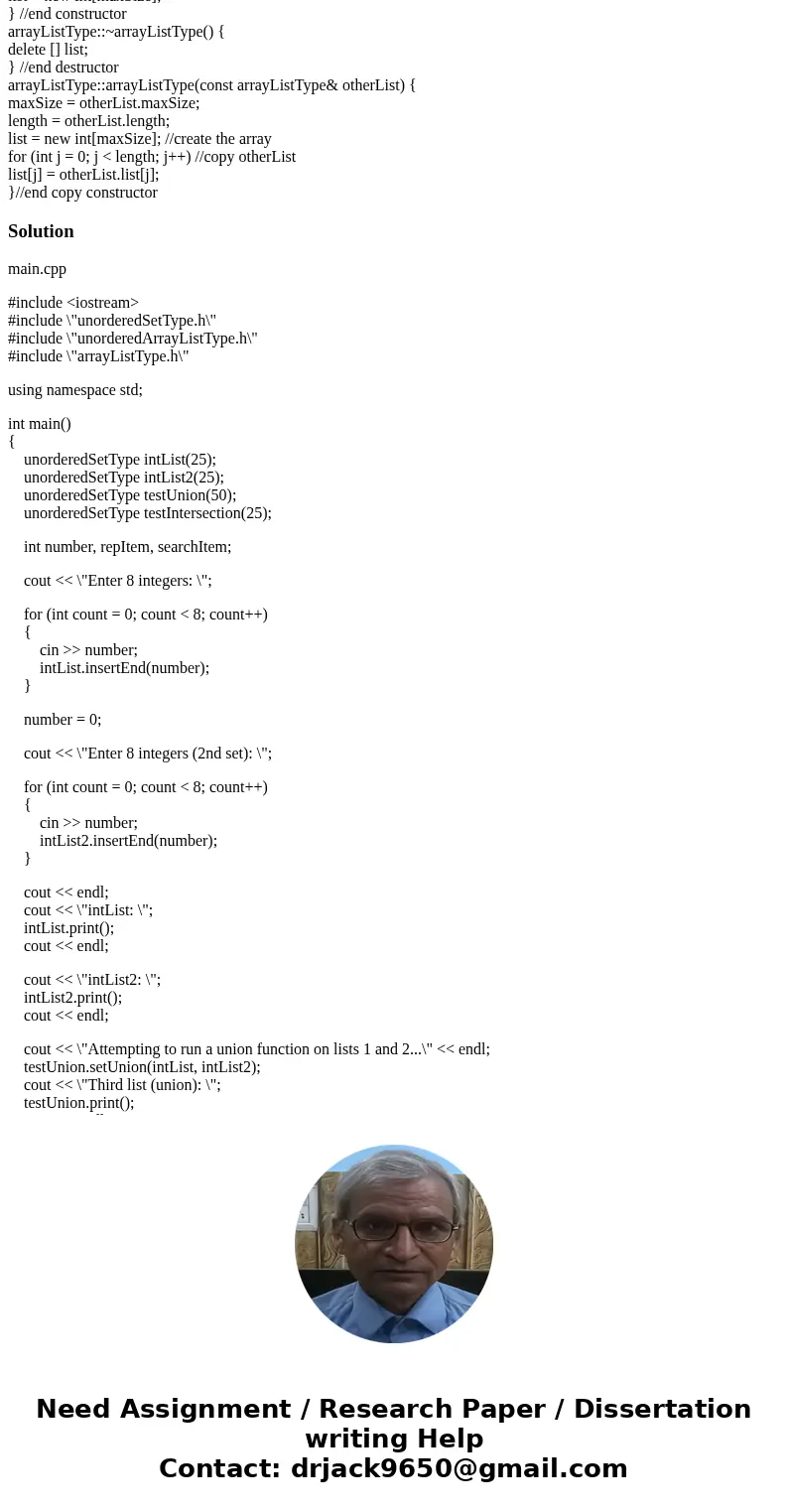
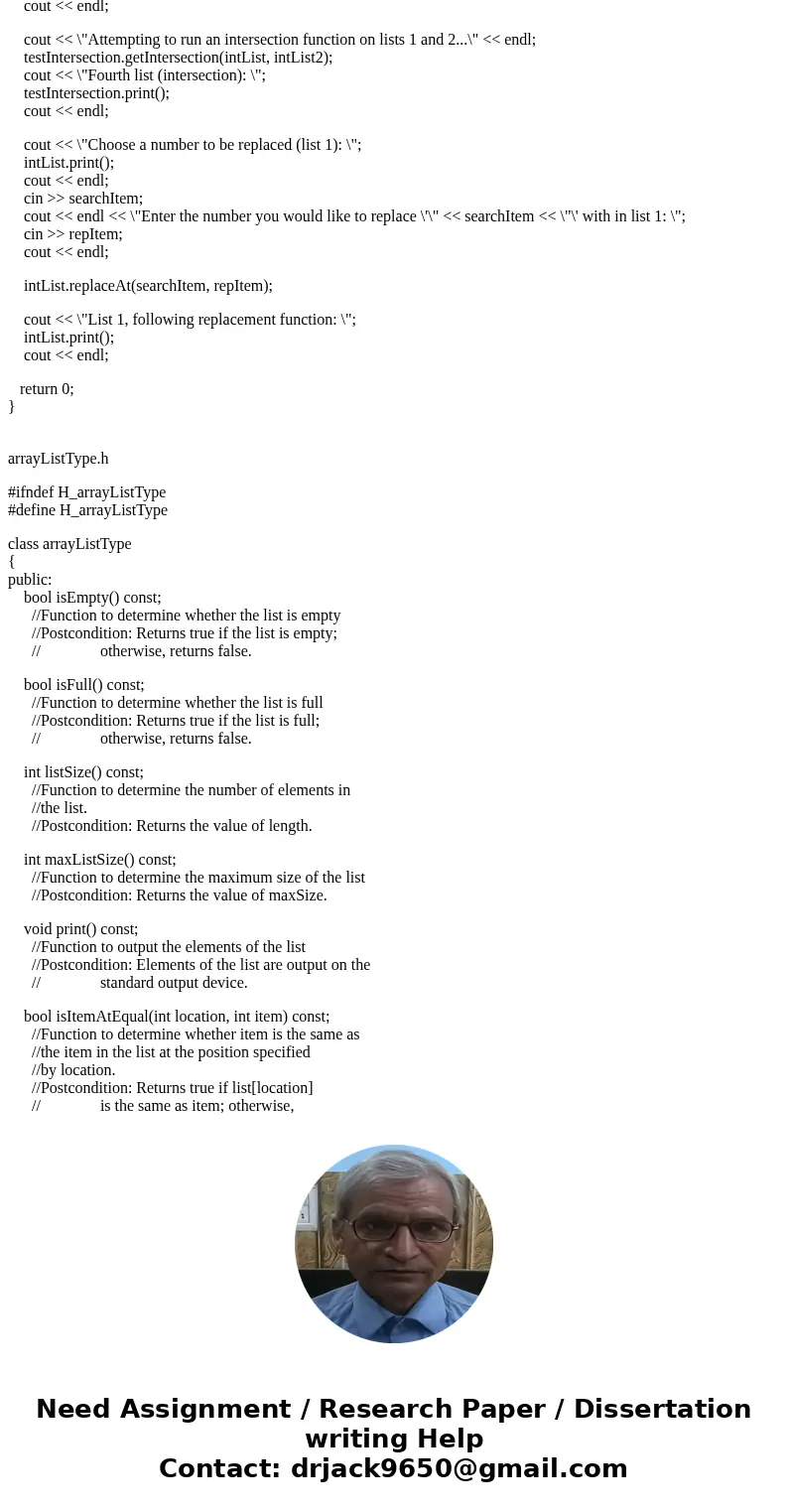
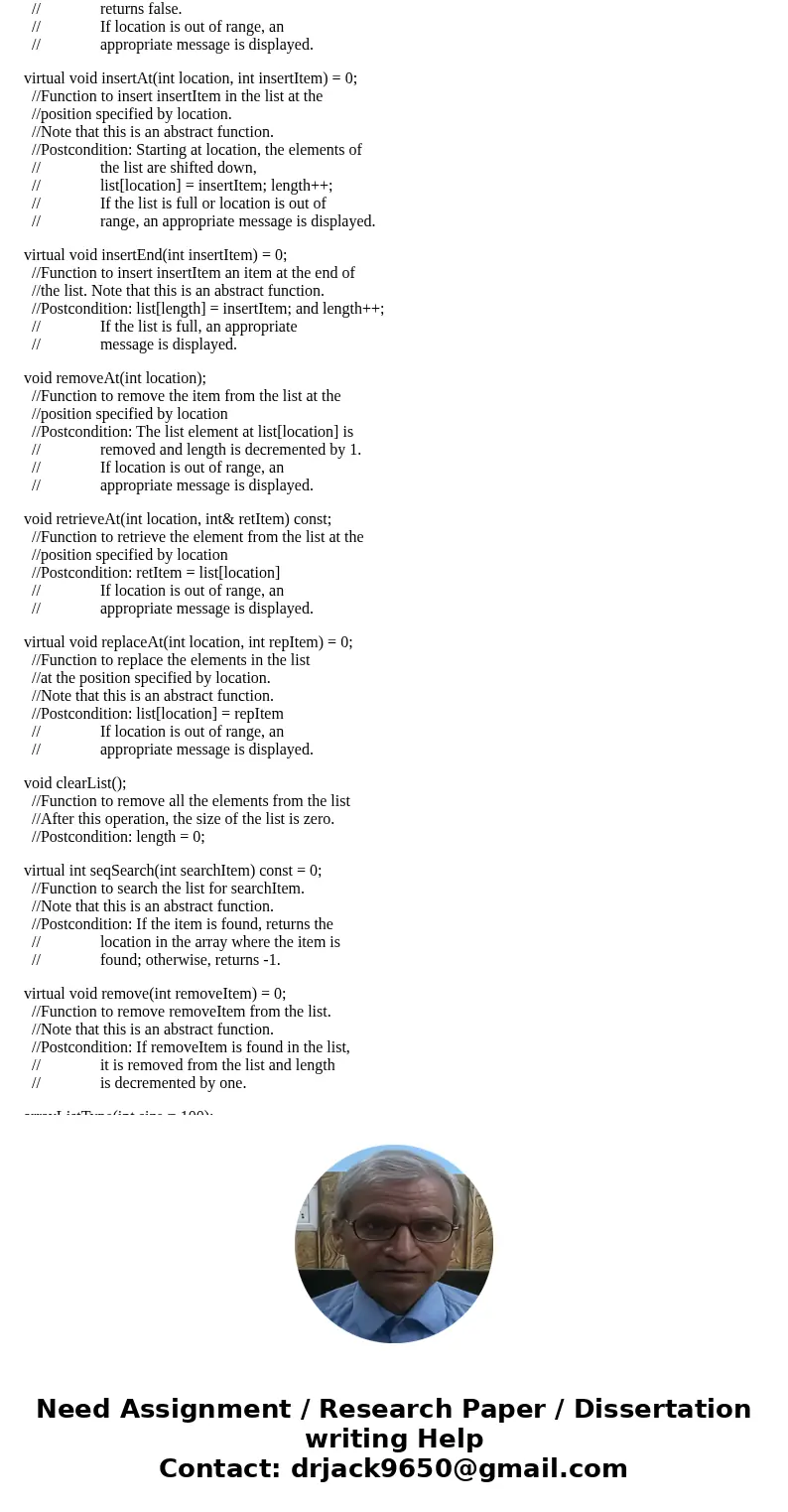
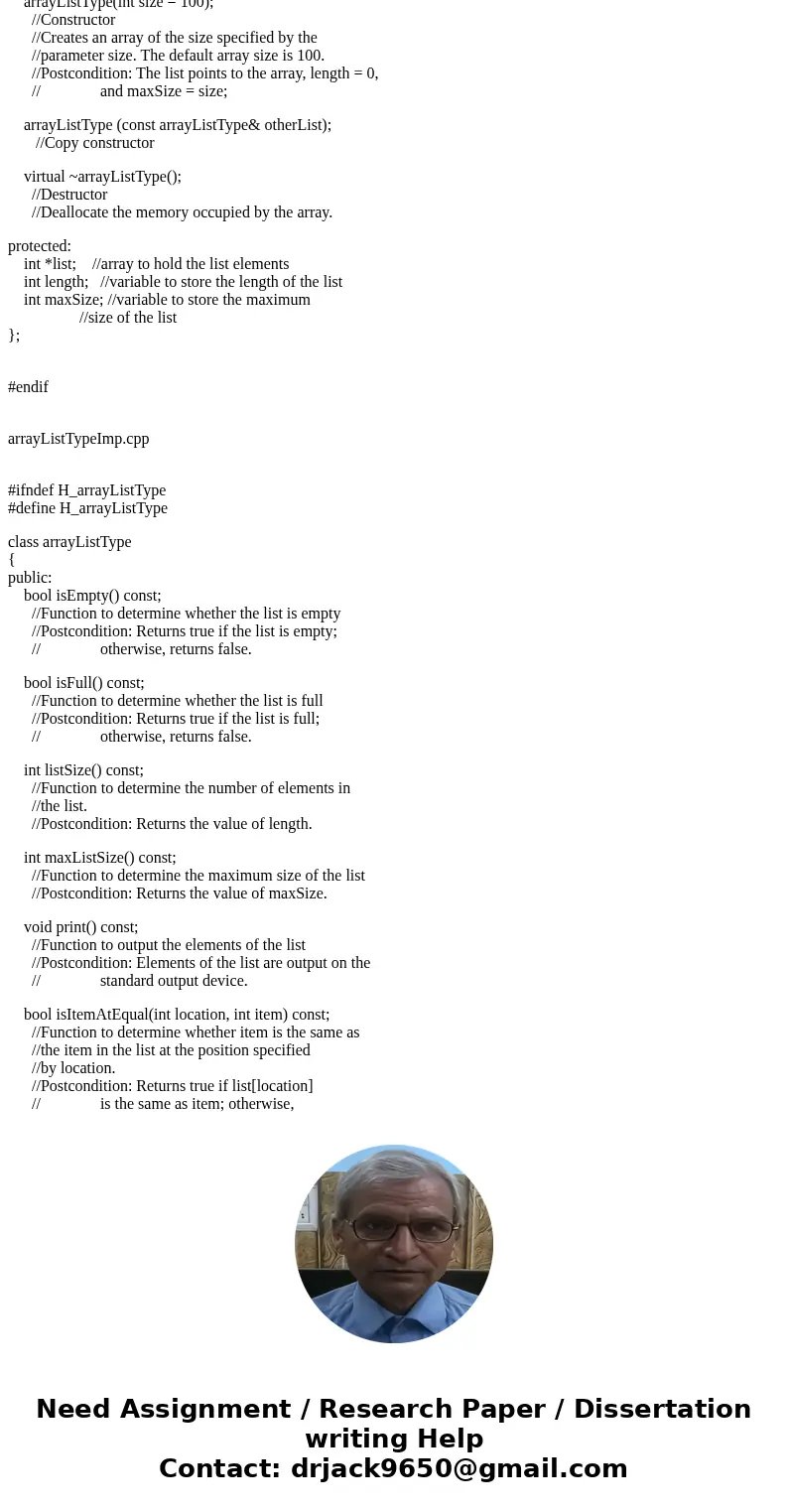
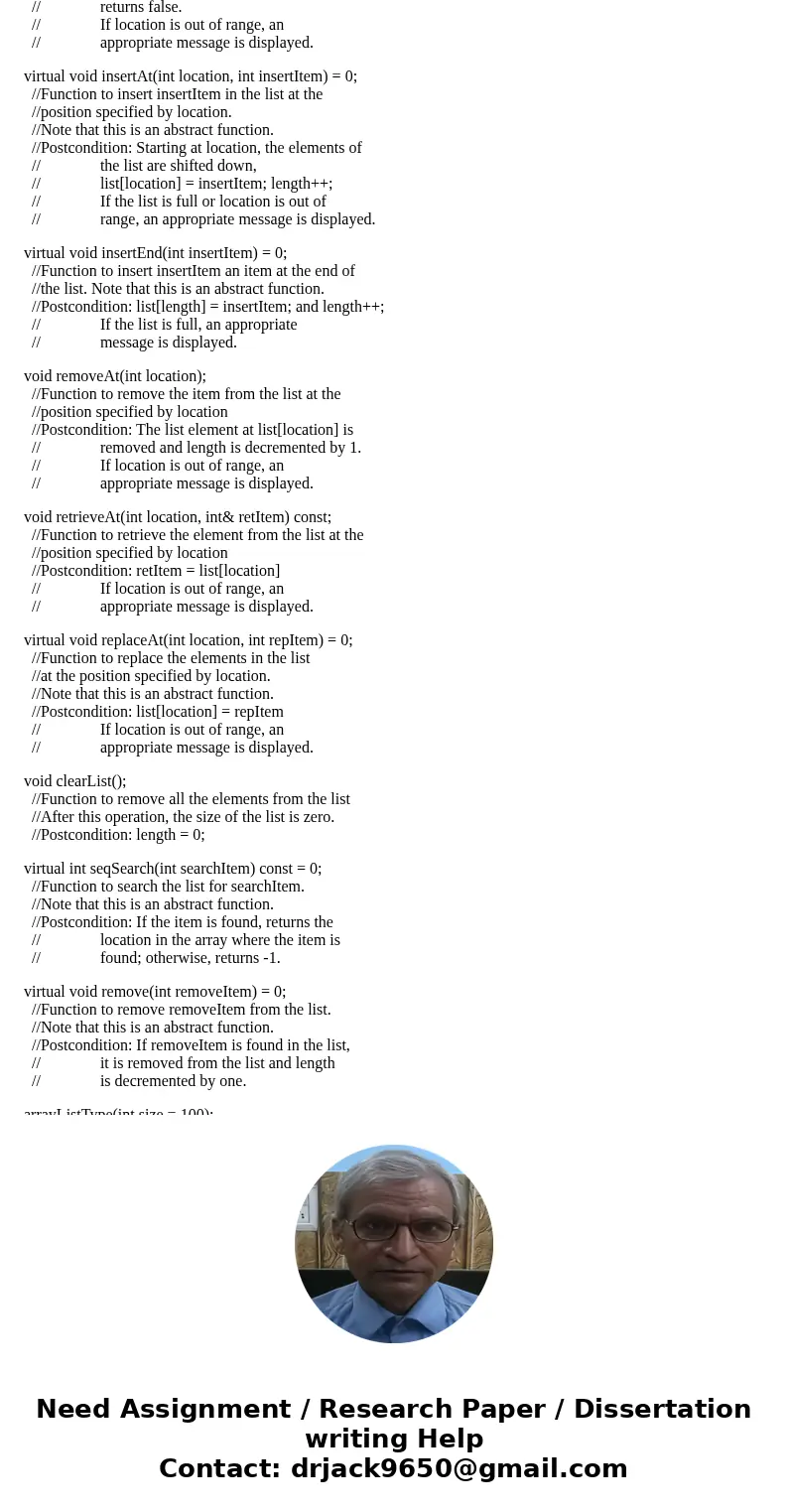
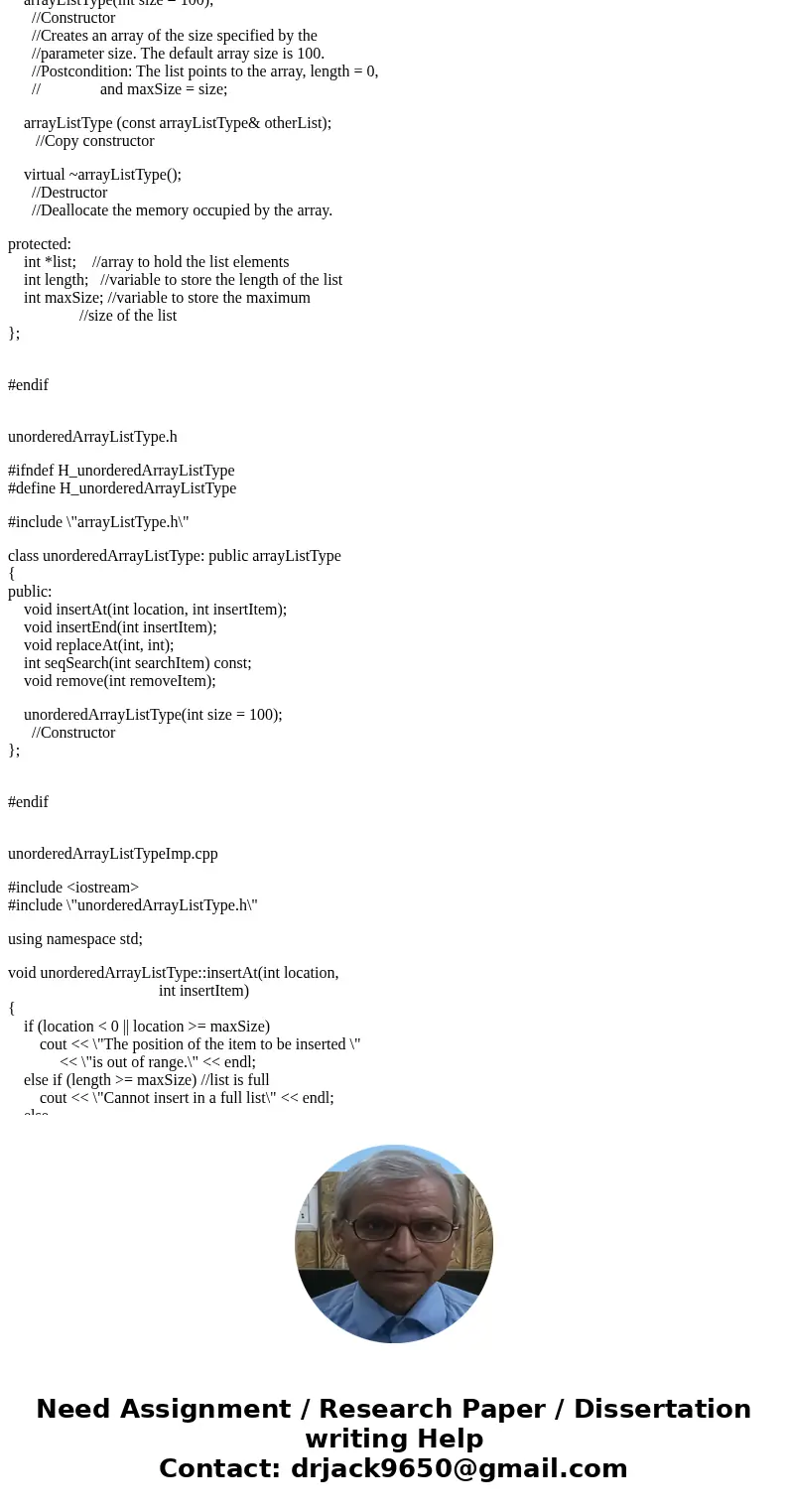
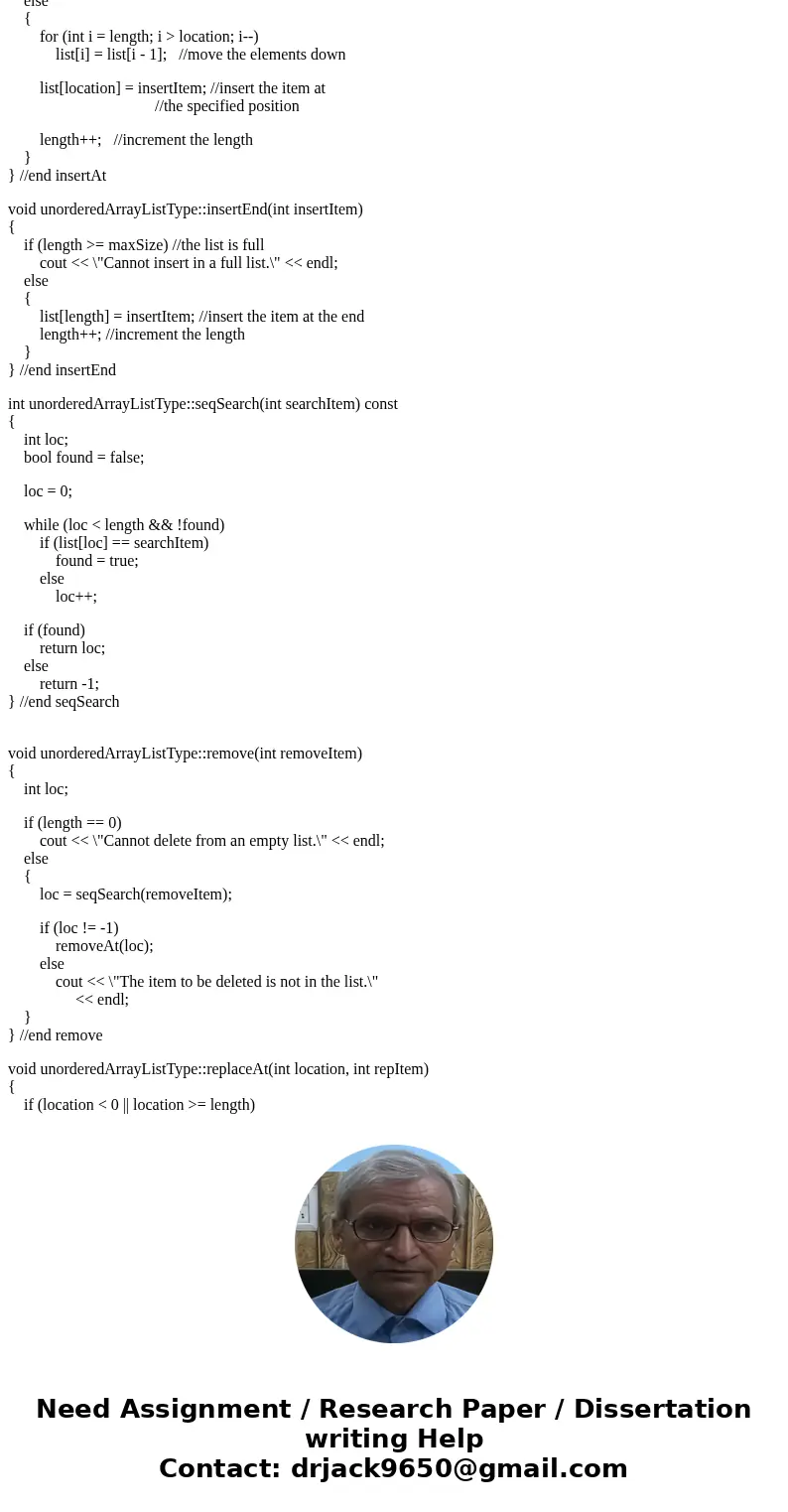
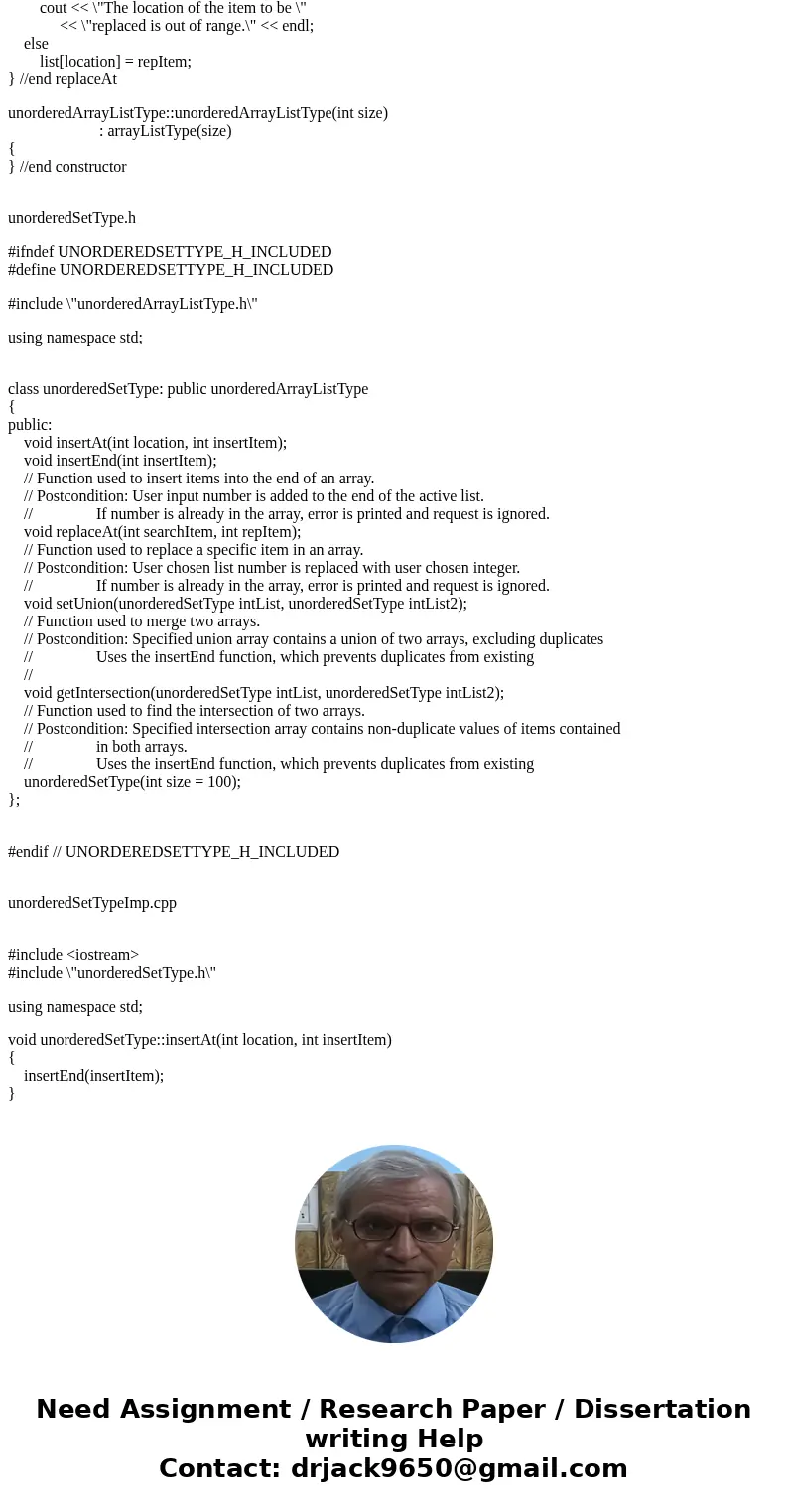
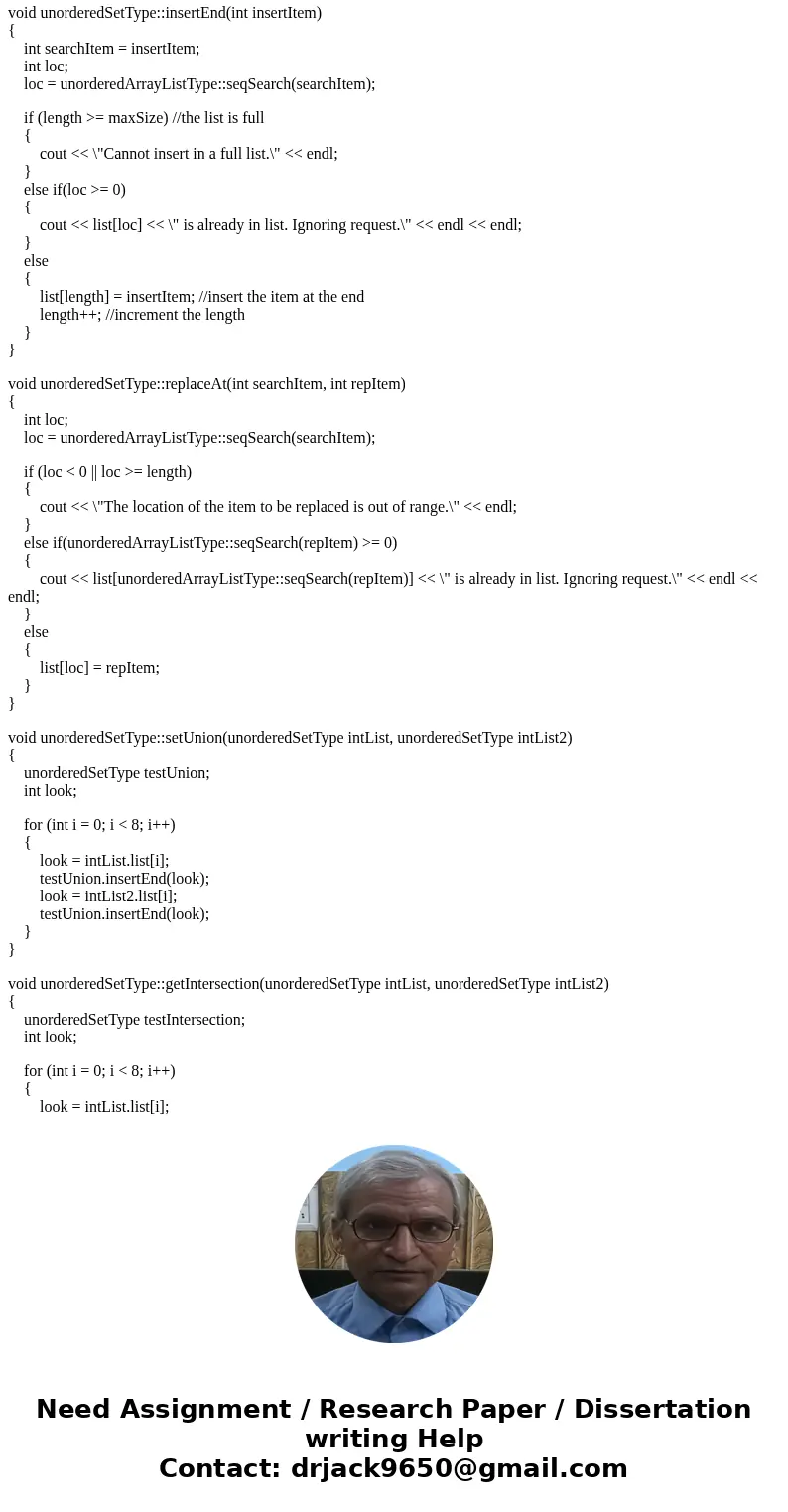
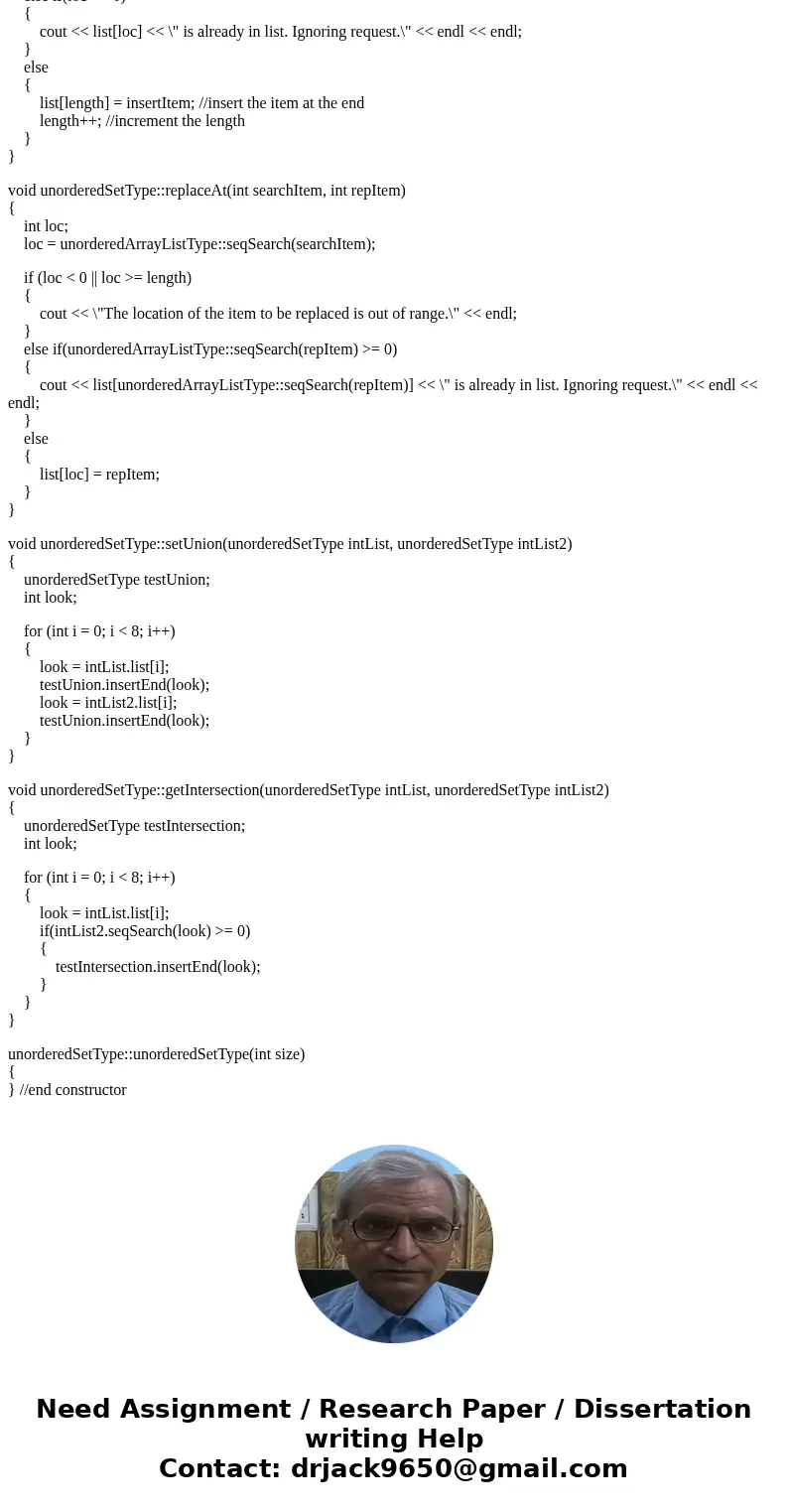
 Homework Sourse
Homework Sourse